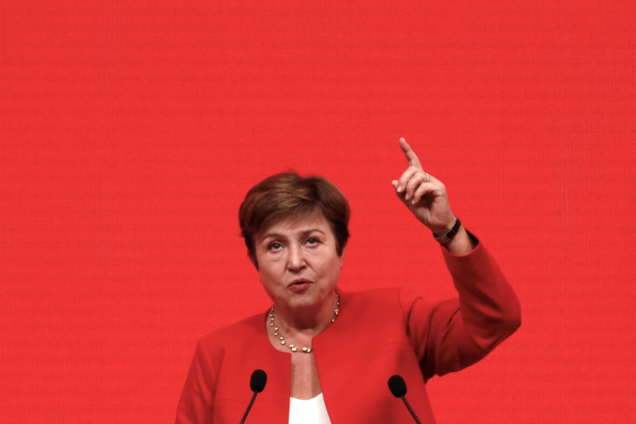Ghana has reached a Staff-Level Agreement with the International Monetary Fund (IMF) for the second review of the Extended Credit Facility, but the Executive Board insists that the Ghanaian authorities must obtain the needed financial assurances from external creditors before disbursing the planned $360 million.
During April 2-12, 2024, an IMF staff delegation led by Stéphane Roudet, the Mission Chief for Ghana, convened in Accra to review the country's reform progress and the government's policy focus within the framework of the second evaluation of Ghana's three-year programme under the Extended Credit Facility.
Ghana has begun another debt restructuring dance toward securing a $360 million package after reaching an IMF Staff-Level Agreement.
Beyond this agreement, there’s a big hurdle for the West African nation to cross as it works towards obtaining key financing assurances from its external bilateral creditors.
"This staff-level agreement is subject to IMF Management approval and Executive Board consideration once the necessary financing assurances have been received.
"An agreement between the Ghanaian authorities and their official creditors on an MoU for a debt treatment in line with program parameters would provide the needed financing assurances"
With this condition in full swing, it means Ghana has not yet completed the second review to trigger the release of the $360 million.
The IMF Mission Chief for Ghana pointed out that the "staff-level agreement is subject to IMF Management approval and Executive Board consideration once the necessary financing assurances have been received.
"An agreement between the Ghanaian authorities and their official creditors on an MoU for a debt treatment in line with program parameters would provide the needed financing assurances."
The Fund has stressed that to ensure the timely completion of the review, Ghana and its official bilateral creditors need to reach an agreement on a Memorandum of Understanding for a debt treatment, consistent with the agreement in principle reached in January 2024.
In fact, in January 2024, the Finance Ministry stated that the terms of the approved debt relief plan with official bilateral creditors were expected to be finalised in a Memorandum of Understanding (MoU).
This MoU was anticipated to be executed through individual bilateral agreements with each member of the Official Creditor Committee.
"The terms of the agreed debt treatment are expected to be formalised in a Memorandum of Understanding between Ghana and Official Creditors, which will then be implemented through bilateral agreements with each member of the Official Creditor Committee.
"The Government of Ghana looks forward to further engaging with the Official Creditors to ensure prompt implementation of the agreed terms" the ministry indicated.
Dealing with each creditor can be a difficult task as the issue of comparability of treatment is likely to pop up at every stage of the negotiations which could delay the IMF Executives Board’s passing of Ghana’s second review programme.
But until Ghana obtains the needed financing assurances in a formalised MoU, it will be difficult for the $360 million to hit the account of the Bank of Ghana.
Nevertheless, Ghanaian authorities hold a strong belief that the necessary financial assurances will be secured, as they anticipate fruitful discussions on debt restructuring with external creditors, particularly those in the bilateral sector.
About the writer:
Isaac Kofi Agyei is a Data & Research Analyst/Journalist at JoyNews based in Accra, where he covers mostly finance, economics, banking, and politics across Ghana and West Africa, from detailed analytical reports on all key issues to debt crises to IMF programmes. He also serves as the data and research correspondent for SBM Intelligence, an Africa-focused market/security leader in strategic research, providing actionable analyses of West Africa’s socio-political and economic landscape. With his solid academic background in economics and statistics and additional training from credible institutions such as the UNDP, Afrobarometr, Ghana Statistical Service, and a host of others, Isaac has honed his skills in effective data storytelling, reporting, and analysis.

Isaac Kofi Agyei
Latest Stories
-
Price of LPG per kilogramme constitutes 22% of taxes – LPG Marketers Association
27 mins -
Nigeria appoint Finidi George as new Super Eagles boss
57 mins -
Elevating Ghana’s creative industry: A blueprint for competing with Nigeria and South Africa
2 hours -
Poor finishing a problem for Asante Kotoko throughout the season – Prosper Ogum
3 hours -
Samini teams up with Francis Osei for ‘Sticks N Locks’ EP
3 hours -
Government should resource record labels – Seven Xavier
3 hours -
I need majority in parliament to successfully complete my term – Akufo-Addo pleads
3 hours -
Next NDC government will not recognise illegal contracts signed by current administration – Sammy Gyamfi
3 hours -
Premier League clubs vote in favour of spending cap plans
3 hours -
Nigeria’s fuel crisis brings businesses to a halt
3 hours -
King Promise impresses fans at sold out show in Singapore
4 hours -
Ejisu by-election to proceed after plaintiff withdraws injunction application
4 hours -
CSOs and NGOs unite to push for priority demands at INC-4
4 hours -
Fuel tanker bursts into flames on Kumasi-Accra highway
4 hours -
Security is tightened ahead of Ejisu by -election
4 hours

